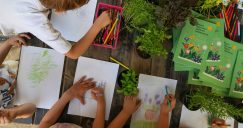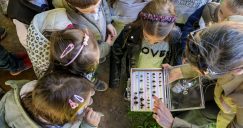Attending to equity
Place-Based Learning

- Article, Educational resource, Research
While rooted in science education, science communication and public engagement, the approaches dovetail and overlap with the well-established field of place-based education. Place-based education is a powerful local approach to education for environmental justice and climate action. According to Sobel (2004), “placebased education is the process of using the local community and environment as a starting point”. By rooting learning experiences in contexts that are immediately relevant to participants, the climate crisis becomes more immediately relevant and the responses more empowering. Place-based learning is rooted in six principles:
- Local to global context: Using local issues or learning experiences as a model that can then be scaled up and applied to global challenges and connections. 50
- Learner centred: Ensuring that learning is directly and personally relevant to the learners.
- Inquiry-based: Learning follows the scientific method – observation, questions, hypotheses, and data collection – to understand economic, ecological, and sociopolitical environments.
- Design thinking: Students are given (or identify) a problem, the constraints, and a solution, and are then empowered to take action to improve their community. These problems are approached through the framework of design thinking which contains four stages: Define, Generate, Create, and Evaluate
- Community as classroom: The learning ecosystem extends beyond the classroom including local knowledge, experiences, and places.
- Interdisciplinary: Teaching occurs across the traditional bounds of discipline and in an integrated, project-based manner.
Resource
Case Study: Eco-Capabilities project
The Eco-Capabilities project, led by Prof Nicola Walshe (UCL), a research project exploring how the wellbeing of children living in areas of high deprivation were supported by working with artists in familiar outdoor places.
Read: ‘The heart of the forest is here’
The Eco-Capabilities project is featured in the article: ‘The heart of the forest is here’: Reframing children’s disempowered relationships with once-familiar places through Eco- Capabilities. In Encountering Ideas of Place in Education.









